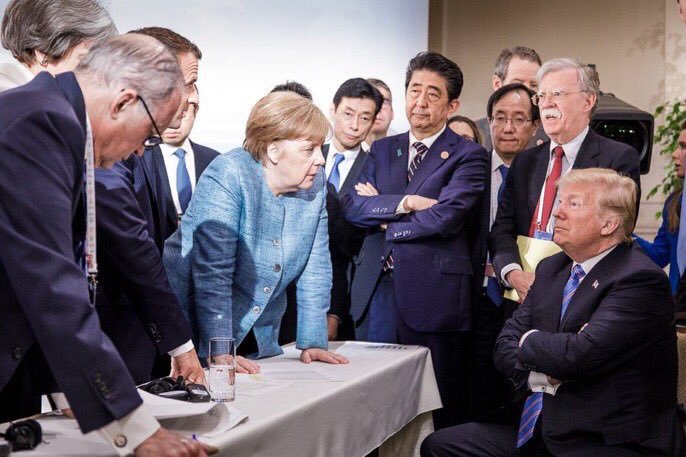Interview on Atlantico 23/9/2018
Shinzo Abe has been re-confirmed as the head of the LDP, a position that could keep him in power until 2021, which would be a record in Japan. After the Japanese deflation of 1990-2012, Abe was elected with a kind of flavour of populism in 2012. Should we see Japan as a poster boy of populism, or could we see Shinzo Abe a kind of antidote ?
In my view, very much an antidote. Shinzo Abe is a consummate political insider. As a matter of fact, I met him briefly before he even became a politician, but he was already “in training,” attending a wedding in the place of his father who was Foreign Minister at the time.
Abe’s maternal grandfather, Nobusuke Kishi, was a prime minister. Kishi’s brother, Eisaku Sato was also a prime minister who won the Nobel Peace Prize in 1974. Abe’s paternal grandfather was a parliamentarian of pacifist leanings. So he is a political “blue blood” in Japanese terms.
Shinzo Abe achieved prominence initially because he took up the cause of the abductees, Japanese citizens kidnapped from Japanese soil and in Europe by North Korean agents, in some cases with the involvement of North Korean sleepers in Japan and Japanese radical leftists based in Pyongyang. It was an issue that nobody wanted to touch, to the extent that it was treated as some far-fetched conspiracy theory.
Abe was the only mainstream politician willing to get involved. When Kim Jong Il admitted to the abductions, Abe’s political stock soared and he became the designated successor of then Prime Minister Koizumi.
His first stint in power, in 2006/7 ended in failure because he had nothing to say on economics. At that time, he was a standard, backward-looking conservative who talked a lot about traditional family values, patriotism and so forth. Meanwhile Japan was stuck in the mire of deflationary stagnation.
The political success of Abe.2 derives from the failure of Abe.1 When he made his comeback in 2012, reflation was the key element in his platform. He also dialled down the conservatism, pushing “womenomics”, corporate governance reform and the market opening measures associated with the TPP – which were unpopular with key LDP supporters such as farmers. He also loosened entry requirements for Chinese tourists despite the sometimes rocky relations between the two countries.
Abe brought in his own economic policy team, which was absolutely unprecedented and perhaps the biggest change of all. Normally economic policy was made by the Ministry of Finance and the Bank of Japan, which were controlled by lifetime career staff. They had repeatedly failed to handle the challenges of Japan’s so-called lost decades so it was definitely time for a change.
I wouldn’t call this populism – the most influential advisor was a Professor Emeritus at Yale University – but it was a move against the dominance (and group-think) of the bureaucracy. The willingness to try heterodox ideas was, in the circumstances, an expression of pragmatism.
How did he build his electoral success during these years? What was the trigger for this Japan’s revival?
Abe has won five national elections by comfortable majorities and also has just been re-elected as leader of his party with twice the number of votes of his rival. His advisors are very smart. Abe himself is not particularly charismatic or eloquent, but those are qualities which are not held in high regard in Japan. He works extraordinarily hard – he has visited 80 different countries in the past six years – despite uncertain health.
Anti-Abe people say he is not that popular, but in fact his support rates are high compared with nearly all his predecessors, going back many decades. In my view, this is at least three quarters due to the much better economic conditions. Job growth has been extraordinary and deflation of asset prices has come to an end. Even the debt to GDP ratio has started to fall – all because GDP is rising.
What are the lessons that western leaders could learn from Shinzo Abe? What are the lessons for Europe?
Countries in the Eurozone have policy constraints that Japan does not. But the basic economic message is as follows –
A) You have to grow your way out of a slump
B) There is no sure-fire solution, but a pragmatic, trial-and-error approach using all available policy levers, has the best chance of success.
C) There will be no “debt crisis” for countries or areas that are net creditors / have current account surpluses. In such cases, a yawning government deficit is merely the other side of the ledger of a bulging private sector surplus – which is inevitable in an era of deleveraging.
D) The more growth, the more tax revenues, the less public debt issuance. Japanese tax revenues have soared since Abe took over.
On politics and populism, I would say – borrowing this formulation from Professor Cas Mudde of the University of Georgia – that Japan is less liberal, but more democratic than the majority of Western countries and the EU itself. By more democratic, I mean that the elite is closer to the demos in values, interests and culture. That in itself is powerful inoculation against populism.
Historically, you only get populism when liberalism has failed. That primarily means failure in economic terms, but there are cultural and social fissures that matter too.
